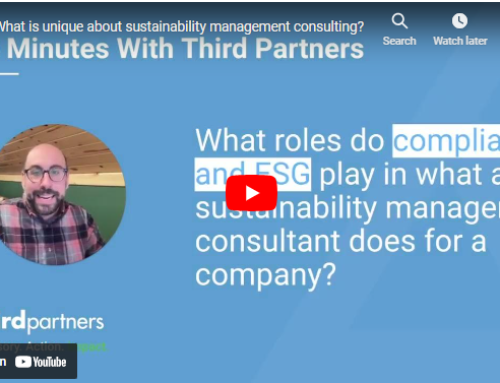Overview
The business value of sustainability is becoming more and more clear to companies. In recent years, products marketed as “sustainable” were responsible for 50% of growth in consumer packaged goods, and sustainable equity funds outperformed their traditional peers. Yet the landscape of corporate sustainability is crowded with jargon. Here, we decode CSR, ESG, and other key sustainability business terms to help you identify a path towards sustainability that resonates with your organization.
What is sustainability in business terms?
In business terms, sustainability is a broad phrase that is often used synonymously with Corporate Social Responsibility (CSR) and Environmental, Social, and Governance (ESG). These strategies can be the basis for either general goals (e.g., improve social impact, reduce waste) or specific targets (e.g., greenhouse gas reduction goals, energy efficiency performance, supply chain resiliency).
What is CSR/CR?
Corporate social responsibility (CSR), sometimes shortened to corporate responsibility (CR), is a common theme in companies’ public-facing annual reports, as well as internal communications. CSR/CR is a broad concept that refers to the accountability of a company to all of its stakeholders, with specific priorities varying from one company to another. Companies’ CSR/CR strategies often include sustainability.
What is ESG?
Of particular relevance to publicly traded companies, ESG stands for Environmental, Social, and Governance. Under each letter (“E,” “S,” and “G”), companies disclose various measures of performance and risk. For example, “E” may include data on a company’s contribution to climate change via greenhouse gas emissions, and “S” may reflect the company’s record on human rights controversies. Raters, such as Refinitiv, use ESG data to help investors in comparing the relative strengths and weaknesses of different companies.
What else is important to know about sustainability for business?
While the terms above are widely used, you may also come across words like “citizenship” and “impact,” which are less standardized and may be targeted towards a smaller audience.
Although it might seem easy for a company to stamp a sustainability label on a product, it is illegal to do so, unless the company can actually back up its claims. In the U.S., the Federal Trade Commission provides guidance on how to maintain legitimacy in environmental marketing claims (i.e., how to avoid greenwashing).
Stakeholders want different sustainability measures – who wants what?
- Investors: risk disclosure (climate, water, forests, supply chains) and business ethics
- Buyers and retailers: product safety; value/access; food waste; recyclability; supply chain traceability and transparency; and more
- Employees: crossover in interests with buyers/consumers; social issues in the workplace are top priorities
- NGOs, watchdogs, media: hundreds of niche issues, e.g., ocean plastic pollution, fair labor, water stewardship, and land use
The United Nations described sustainability as “meeting the needs of the present without compromising the ability of future generations to meet their own needs.” As applied to businesses, sustainability involves balancing profitability with commitments to being good stewards of communities and of the environment. Increasingly, consumers and investors are demanding that businesses make a positive impact on society and the planet, rather than existing solely to generate profit.
How can Third Partners help your organization?
We have experience developing customized strategy, implementation, and branding for companies across industries and of all sizes, ranging from growth stage start-ups to publicly traded, multinational corporations. Contact us to discuss how we can support your organization with CSR, sustainability, and ESG.



